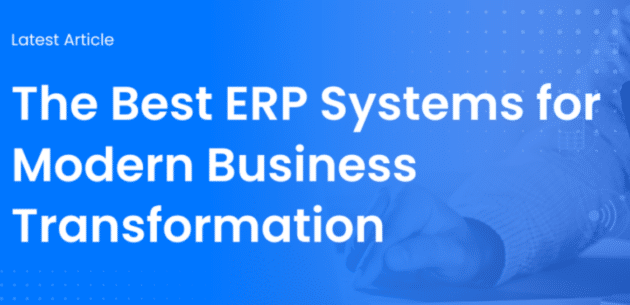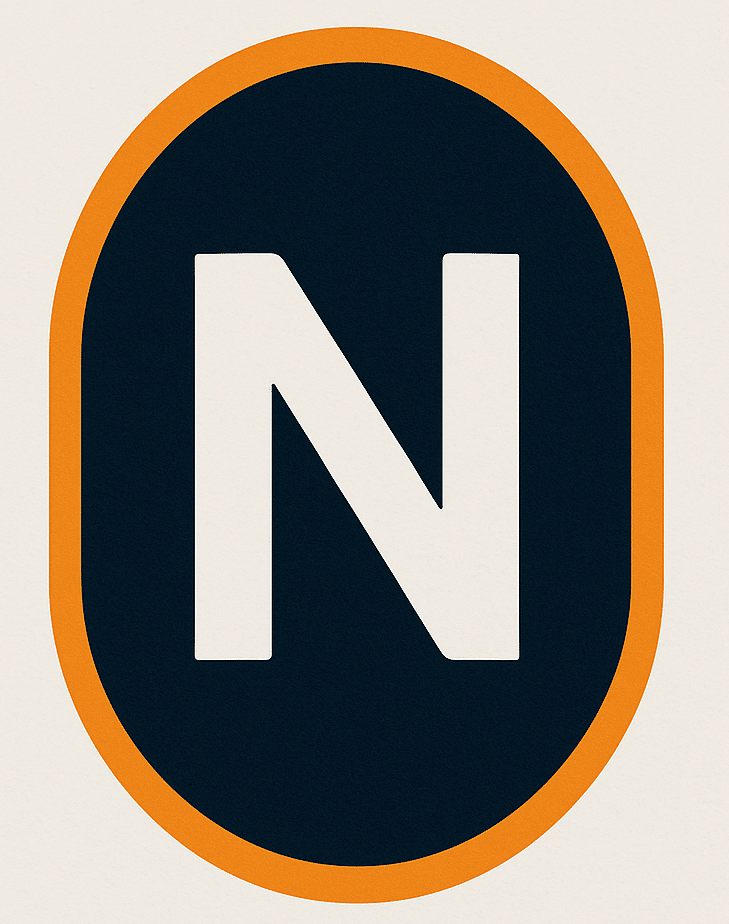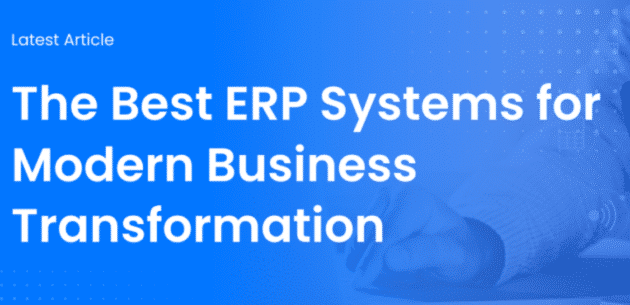The Best ERP Systems for Modern Businesses: A Comprehensive Guide – In today’s competitive business environment, efficiency, data integration, and streamlined operations are crucial to staying ahead. One tool that has proven indispensable for organizations looking to optimize their operations is Enterprise Resource Planning (ERP) software. By integrating multiple business processes into one unified system, ERP software helps companies manage everything from financials, inventory, and human resources to customer relationship management (CRM), supply chain operations, and production planning. However, with many options available, identifying the best ERP system for your business can be overwhelming.
This article will guide you through what makes an ERP system the best and review some of the top ERP software solutions available today.

What Makes an ERP System the Best?
Before exploring specific ERP platforms, it’s important to understand the criteria that define a good ERP system. While each business’s needs will differ, several factors universally contribute to a top-tier ERP solution.
- Comprehensive Integration
The best ERP solution should integrate various business processes and departments into a single system. This integration enables real-time data sharing across the organization, reducing silos and improving decision-making. Whether linking sales with inventory or finance with production, the ERP should streamline communication and workflows.
- Scalability
As businesses grow, so do their operational needs. The best ERP system must be scalable, allowing companies to add new modules, users, and functionalities without requiring a complete system overhaul. Scalability ensures that the ERP solution can grow alongside your business, supporting current and future needs.
- Customization and Flexibility
Businesses have different processes, so the best ERP must offer flexibility and customization options. A great ERP system allows for tailored workflows, reports, and dashboards that align with your company’s unique requirements. Whether you are in manufacturing, retail, or services, the ERP should accommodate industry-specific needs.
- Ease of Use
Even the most powerful ERP system is of little value if it’s challenging to use. An intuitive interface, easy navigation, and a user-friendly experience are critical. The best ERP systems simplify complex processes, allowing employees to learn and leverage the system quickly without extensive training.
- Real-Time Analytics and Reporting
One key advantage of using an ERP is the ability to generate real-time data and insights. The best ERP systems provide advanced reporting features and analytics tools that allow businesses to monitor key performance indicators (KPIs), track progress, and identify areas for improvement. Real-time data empowers businesses to make faster, more informed decisions.
- Cloud and Mobile Accessibility
Access to information from any location is vital in today’s digital world. Cloud-based ERPs enable businesses to operate from multiple locations, provide remote employees access to the system, and offer scalability without heavy infrastructure investments. The best ERP systems also offer mobile apps or interfaces so employees can access essential data.
- Security and Compliance
With the growing concerns around data breaches and cybersecurity, the best ERP systems prioritize robust security features. These include encryption, access control, audit trails, and regular backups. Additionally, compliance with industry standards and regulations, such as GDPR or HIPAA, is critical.
The Best ERP Systems in 2024
Now that we’ve covered the critical characteristics of the best ERP system, let’s examine some of the top ERP solutions available today.
1. SAP S/4HANA
SAP S/4HANA is one of the most widely recognized and respected ERP systems globally, designed for large enterprises. It’s knoIt’sor, an in-memory database technology that enables real-time processing and analytics. SAP’s moSAP structure allows businesses to choose the specific features they need, including financial management, supply chain, procurement, and sales.
- Strengths: High-level scalability, advanced data analytics, integration across multiple industries.
- Ideal For: Large enterprises with complex operations.
- Cloud Option: Yes, available on-premise or in the cloud.
- Pricing: Based on business size and customization needs, typically on the higher end.
2. Oracle NetSuite
Oracle NetSuite is a cloud-based ERP popular with growing businesses and mid-sized enterprises. It covers various functionalities, including financials, CRM, e-commerce, inventory management, and supply chain. Its user-friendly interface and robust scalability make it a favorite among companies seeking flexibility without sacrificing performance.
- Strengths: Comprehensive cloud solution, easy to implement, great for financials and e-commerce.
- Ideal For: Small to mid-sized businesses and growing enterprises.
- Cloud Option: Yes, fully cloud-based.
- Pricing: Subscription-based, offering scalable pricing depending on the modules used.
3. Microsoft Dynamics 365
Microsoft Dynamics 365 combines ERP and CRM functionalities into a single cloud-based solution. It offers a variety of industry-specific solutions for retail, finance, manufacturing, and professional services. Built on the Microsoft Azure platform, Dynamics 365 integrates seamlessly with other Microsoft tools, such as Office 365 and Power BI, making it an excellent choice for organizations already using the Microsoft ecosystem.
- Strengths: Strong integration with Microsoft products, flexible modules, AI and data-driven insights.
- Ideal For: Mid-sized to large businesses that need ERP and CRM capabilities.
- Cloud Option: Yes, fully cloud-based.
- Pricing: Modular, subscription-based, offering flexibility in pricing.
4. Infor CloudSuite
Infor CloudSuite is another popular cloud-based ERP solution that caters to specific industries, including healthcare, manufacturing, retail, and the public sector. It is highly customizable and offers advanced data analytics, artificial intelligence (AI), and machine learning (ML) capabilities to optimize operations. Infor’s Infor’s user interface and focus on industry-specific needs set it apart from other ERP systems.
- Strengths: Industry-specific modules, AI and ML integration, user-friendly interface.
- Ideal For: Businesses in niche industries such as healthcare and manufacturing.
- Cloud Option: Yes, fully cloud-based.
- Pricing: Flexible pricing depending on modules and customization.
5. Epicor ERP
Epicor is well-known for its focus on manufacturing and distribution industries, offering robust tools for production management, inventory tracking, and supply chain optimization. Epicor ERP is scalable and highly customizable, focusing on enabling manufacturers to improve efficiency and profitability. Epicor is available as an on-premise and cloud-based solution, offering flexibility for businesses of all sizes.
- Strengths: Industry-specific for manufacturing, robust production, and supply chain management tools.
- Ideal For: Manufacturing and distribution industries.
- Cloud Option: Yes, available both on-premise and in the cloud.
- Pricing: Pricing is typically higher, especially for advanced features.
6. Odoo
Odoo is an open-source ERP system that is highly customizable and cost-effective, making it ideal for small to mid-sized businesses. It offers various applications, including CRM, e-commerce, inventory, accounting, and project management. One of Odoo’s sOdoo’scant advantages is its modular nature, allowing businesses to start small and expand as their needs grow.
Strengths: Cost-effective, modular, highly customizable, open-source.
Ideal For: Small to mid-sized businesses looking for flexibility at a lower cost.
Cloud Option: Yes, cloud and on-premise options are available.
Pricing: Lower cost compared to other ERPs, with a subscription-based model.
7. Sage X3
Sage X3 is designed for mid-sized companies. It offers robust ERP functionality, focusing on financial management, inventory control, production management, and supply chain management. Sage X3 provides real-time insights, comprehensive reporting, and advanced customization options, making it suitable for companies seeking better control over their operations.
- Strengths: Strong financial management tools, real-time data insights, and scalability.
- Ideal For: Mid-sized businesses with complex financial and supply chain needs.
- Cloud Option: Yes, cloud and on-premise options are available.
- Pricing: Mid-range, subscription-based.
How to Choose the Best ERP for Your Business
Choosing the best ERP for your organization depends on several factors, including:
Business Size and Complexity: Smaller businesses may opt for more affordable and flexible solutions like Odoo, while larger enterprises with complex needs might prefer SAP S/4HANA or Microsoft Dynamics 365.
Industry-Specific Requirements: If your business operates in a highly specialized industry, such as manufacturing or healthcare, you may need an ERP like Epicor or Infor CloudSuite that caters to your industry.
- Budget: ERP systems range in pricing from affordable open-source solutions to high-end enterprise solutions. Assess your budget and look for ERP software that offers the best ROI for your needs.
- Cloud vs. On-Premise: Cloud-based solutions offer flexibility, lower upfront costs, and easier maintenance, making them ideal for businesses looking to minimize IT overhead. On-premise solutions may be preferable for companies with strict data security requirements or those operating in regions with unreliable internet access.
- Customization Needs: Evaluate how much customization your business requires. Some ERPs, like Odoo or Microsoft Dynamics, offer high levels of flexibility, while others may be more rigid but provide deep industry-specific features.
Conclusion
The best ERP system for your business aligns with your company’s company’s budget. Whether you are a small business looking for flexibility or a large enterprise needing comprehensive integration, there is an ERP solution tailored for you. By selecting the right ERP, companies can improve efficiency, streamline operations, and gain a competitive edge in today’s fast-paced market.

